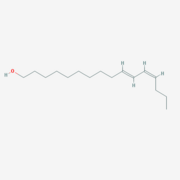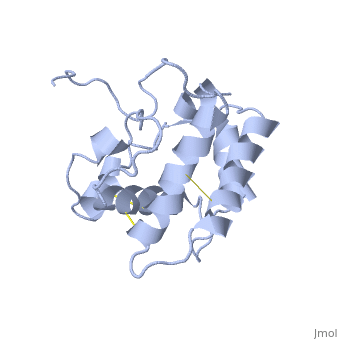Odorant binding protein
From Proteopedia
| Line 68: | Line 68: | ||
Two theories have been propsed for the activation of the odorant receptors located on the dendrtirte membrane. One theory suggests that the pheromone-PBP complex is needed for the receptor activation, while the second theory argue that the pheromone itself is sufficient for the activation of the receptor. | Two theories have been propsed for the activation of the odorant receptors located on the dendrtirte membrane. One theory suggests that the pheromone-PBP complex is needed for the receptor activation, while the second theory argue that the pheromone itself is sufficient for the activation of the receptor. | ||
| - | [[Image:Nmodel.png|thumb|upright=1.5|The events prior the neuron exsitation, according to "N model" suggested by Kaissling (2009)<ref>doi: 10.1007/s00359-013-0812-z < | + | [[Image:Nmodel.png|thumb|upright=1.5|The events prior the neuron exsitation, according to "N model" suggested by Kaissling (2009)<ref>doi: 10.1007/s00359-013-0812-z</ref>]] |
*'''Activation by the pheromone alone''' | *'''Activation by the pheromone alone''' | ||
Revision as of 16:22, 10 January 2015
Contents |
Introduction
Odorant-binding protein (OBP) are soluble proteins which involve in the processes of odorant detection in the olfactory sensilla.
The first OBP that was identified is Bovine odorant binding protein, that was isolated from a cow's mucus ref. Though functunaly same, vertebrates and insects OBP are stucture and different.
OBPs are important for insect olfaction. For instance, OBP76a (LUSH) in the fly Drosophila melanogaster is required for the detection of the pheromone vaccenyl acetate [Ha and Smith, 2006; Xu et al., 2005] and has been proven to adopt a conformation that activates the odorant receptor [Laughlin et al., 2008].

OBP in insects
OBP Function
Despite three decades of intensive research, the exact roles of OBP and the mechanism by which the odorant receptor (OR) is activated are still in dispute [1][2].
A few functions have been suggested for OBP: 1. Solubelizing the odorant molecule and its transportation in the sensillar lymph.
2. Protecting the odorant molecule from the odorant degrading enzymes, in the sensillar lymph.
3. Activating of the odorant receptor on the dendrite membrane, by the odorant-OBP complex.
4. Mediating the deactivation of the odorant molecule after the activation of the receptor.
5. An organic anion (the protein has 9 negative charges).
Of all, the first role of OBP as an odorant solubilizer and carrier is generally accepted.
In order to explain the structure and function of these fascinating proteins, this page will further focus on a particular OBP - the well investigated Bombyx mori PBP: BmorPBP.
PBP
PBPs are specialized members of the insect odorant-binding protein (OBP) super-family, and they are devided into three groups by their lengths: long-chain PBPs (∼160 aa), medium-chain PBPs (∼120 aa), and short-chain PBPs (∼110 aa) [3]
Bombyx mori BmorPBP (lets talk about sex..)
| |||||||||||
See also
References
Proteopedia Page Contributors and Editors (what is this?)
Nurit Eliash, Michal Harel, Joel L. Sussman, Alexander Berchansky, Jaime Prilusky

